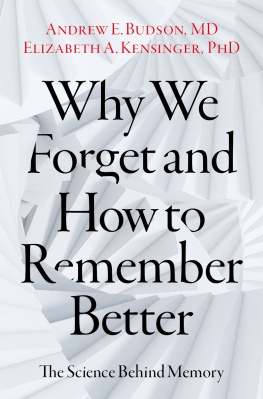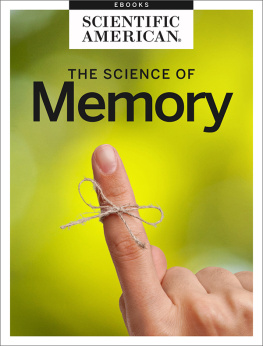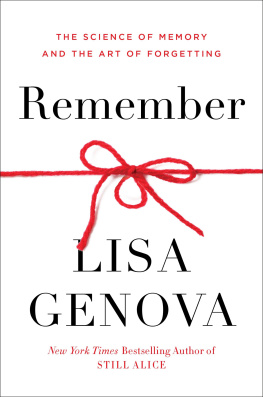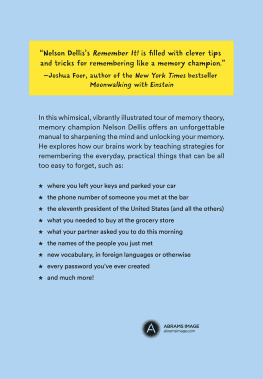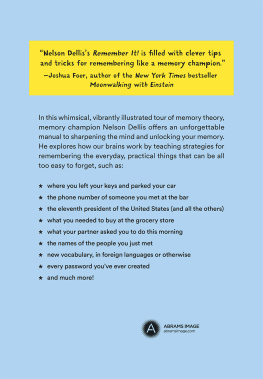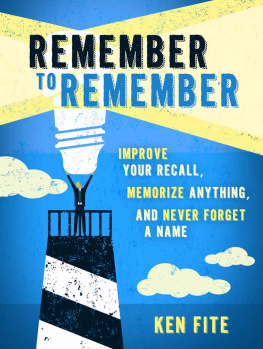Advance Praise for Why We Forget and How to Remember Better
In Why We Forget and How to Remember Better, memory experts Andrew Budson and Elizabeth Kensinger provide readers with a practical and clearly explained masterclass on how memory works and how to keep it working well as we age. This is a must-read for anyone who wants to understand and maximize their memory functions.
Wendy Suzuki, PhD, Professor of Neural Science and Psychology, New York University and internationally bestselling author of Healthy Brain, Happy Life and Good Anxiety
In this highly readable book, two authorities on the science of memory and the brain unpack everything you could want to know about memory and memory disorders. You will find surprising answers here to fascinating puzzlesfor example, why we form false memories, why someone with Alzheimers disease remembers how to play the piano but forgets the names of family members, how to distinguish between memory decline due to normal aging and disorders of memory, and why sleep is so important for memory. In addition, the authors describe evidence-based ways to remember better and to defend against false memories.
Ellen Winner, PhD, Professor Emerita at Boston College and author of the bestselling book How Art Works: A Psychological Exploration
Budson and Kensinger have done a marvelous job creating an accessible summary of the wide-ranging field of memory research. A perfect place to start for anyone interested in understanding this fundamental human capacity.
Joshua Foer, BA, Author of the bestselling book Moonwalking with Einstein
This book delivers on all fronts. Written by two of the most eminent memory scientists in the world, the book draws in the reader immediatelyengaging both the practitioners of the science of memory as well as those who are new to memory research. The reader is presented with many relatable, everyday examples and practical tips, and with concrete steps that unfold and explain complex theories of memory and forgetting. The authors cover a wide range of representative phenomena about when memory works and when it fails. The book delves into the neuroscience of memory and effects of aging at one end, strategies for improving memory at the other, and many key topics in between. I want this book for my memory course, and for my family and friends who are curious about how memory works.
Suparna Rajaram, PhD, Distinguished Professor of Cognitive Science at Stony Brook University
Everyone knows how memory works, we have our own experiences of remembering and forgetting to go on. But the science of memory, as Budson and Kensinger engagingly recount, teaches us so much morehow it really works and how it doesnt. And how this scientifically grounded knowledge enriches our understanding of our own minds.
Ken Paller, PhD, Padilla Chair and Director of the Cognitive Neuroscience Program at Northwestern University

Oxford University Press is a department of the University of Oxford. It furthers the Universitys objective of excellence in research, scholarship, and education by publishing worldwide. Oxford is a registered trade mark of Oxford University Press in the UK and certain other countries.
Published in the United States of America by Oxford University Press
198 Madison Avenue, New York, NY 10016, United States of America.
Oxford University Press 2023
All rights reserved. No part of this publication may be reproduced, stored in a retrieval system, or transmitted, in any form or by any means, without the prior permission in writing of Oxford University Press, or as expressly permitted by law, by license, or under terms agreed with the appropriate reproduction rights organization. Inquiries concerning reproduction outside the scope of the above should be sent to the Rights Department, Oxford University Press, at the address above.
You must not circulate this work in any other form and you must impose this same condition on any acquirer.
Library of Congress Cataloging-in-Publication Data
Names: Budson, Andrew E., author. | Kensinger, Elizabeth A., author.
Title: Why we forget and how to remember better : the science behind memory /
Andrew E. Budson, M.D., Elizabeth A. Kensinger, Ph.D.
Description: New York, NY : Oxford University Press, [2023] |
Includes bibliographical references and index.
Identifiers: LCCN 2022027375 (print) | LCCN 2022027376 (ebook) |
ISBN 9780197607732 (hardback) | ISBN 9780197607756 (epub) |
ISBN 9780197607763 (ebook)
Subjects: LCSH: MemoryPopular works. | MemoryPhysiological
aspectsPopular works. | BrainLocalization of functionsPopular works.
Classification: LCC QP406 .B83 2023 (print) | LCC QP406 (ebook) |
DDC 612.8/23312dc23/eng/20220720
LC record available at https://lccn.loc.gov/2022027375
LC ebook record available at https://lccn.loc.gov/2022027376
DOI: 10.1093/oso/9780197607732.001.0001
This material is not intended to be, and should not be considered, a substitute for medical or other professional advice. Treatment for the conditions described in this material is highly dependent on the individual circumstances. And, while this material is designed to offer accurate information with respect to the subject matter covered and to be current as of the time it was written, research and knowledge about medical and health issues is constantly evolving and dose schedules for medications are being revised continually, with new side effects recognized and accounted for regularly. Readers must therefore always check the product information and clinical procedures with the most up-to-date published product information and data sheets provided by the manufacturers and the most recent codes of conduct and safety regulation. The publisher and the authors make no representations or warranties to readers, express or implied, as to the accuracy or completeness of this material. Without limiting the foregoing, the publisher and the authors make no representations or warranties as to the accuracy or efficacy of the drug dosages mentioned in the material. The authors and the publisher do not accept, and expressly disclaim, any responsibility for any liability, loss, or risk that may be claimed or incurred as a consequence of the use and/or application of any of the contents of this material.
Contents
In Christopher Nolans gripping 2000 film Memento, protagonist Leonard Shelby seeks to find the man who he believes murdered his wife during a violent home invasion. Shelbys search is hampered by a head injury he suffered during the attack that resulted in a loss of his ability to remember ongoing events, making him dependent on handwritten notes, photographs, and even tattooed messages to himself in order to conduct the manhunt. Part of the films genius is that Nolan presents the main plot by showing scenes in backwards order, so that the audiences experience is similar to Leonards: Events unfold, but we have no idea what happened in the past that led to the present moment, requiring us to try to piece together the identity, role, and motives of the people we encounter.
Fortunately, watching Memento is about as close as most of us will ever come to experiencing life with a profound and unrelenting memory impairment. As someone who has spent his entire career studying memory, one of the reasons why I find Memento so compelling is that the film helps us to appreciate the enormous role that memory plays in our everyday lives, which we are liable to take for granted given how seamlessly our memory systems often work. Oftenbut not always. And that is why Andrew Budson and Elizabeth Kensingers new book is so valuable. Memory can fail us in a variety of ways, with consequences ranging from mildly annoying to life-changing. If we cant recall the name of the actor who played Leonard even though we saw

